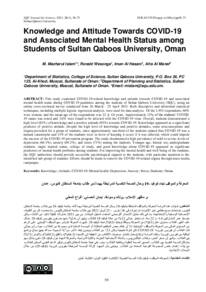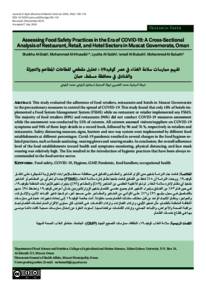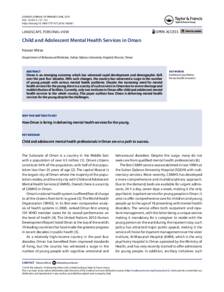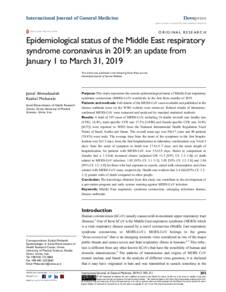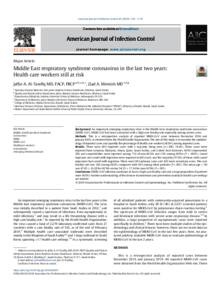Document
Knowledge and attitude towards COVID-19 and associated mental health status among students of Sultan Qaboos University, Oman.
Identifier
DOI: https://doi.org/10.53539/squjs.vol28iss1pp56-73
Source
Sultan Qaboos University Journal for Science. v. 28, no. 2, p 56-73
Contributors
Other titles
المعرفة و الموقف تجاه كوفيد19-وحال الصحة النفسية المرتبطة بهما لدى طلاب جامعة السلطان قابوس، عمان.
Country
Oman.
City
Muscat.
Publisher
College of Science, Sultan Qaboos University.
Gregorian
2023-11-21
Language
English
English abstract
This study examined the COVID-19-related knowledge and attitude towards COVID-19 and associated mental health status during COVID-19 among the students of Sultan Qaboos University in Oman using an online cross-sectional survey conducted from 26 March - 25 April 2021 among the students of Sultan Qaboos University (SQU). Both descriptive and inferential statistical techniques, including multiple logistic regression analysis, were used for data analysis. Of the 1,951 respondents, 60% were females with a mean age of 22 years. About 13% were tested COVID-19 positive and 3.6% were tested positive. Overall, students demonstrated a high level (81%) of knowledge and a positive attitude (83%) towards COVID-19. Knowledge appeared as a significant predictor of positive attitude. Despite the high level of knowledge and positive attitudes, there prevails some misconceptions or stigma to a group of students as about one-third of the students opined COVID-19 was a natural catastrophe and 13% of students were in favor of keeping it secrete if infected. The study documented a high prevalence of mild to severe levels of depression (66.3%), anxiety (69.2%), and stress (71%) among the students. Younger age, female, undergraduate students, single marital status, college of study, and good knowledge about COVID-19 appeared as significant predictors of mental health problems among the students. For improving the mental health and well-being of the students, the SQU authority should provide feasible psychological support to the students, with particular attention to the identified sub-group of students. Efforts should be made to remove the COVID-19-related stigma through mass-media campaigns.
ISSN
2414-536X
Arabic abstract
تناولت هذه الدراسة المعرفة والمواقف المتعلقة بفيروس كوفيد-19 تجاه كوفيد-19 وحالة الصحة العقلية المرتبطة به أثناء كوفيد-19 بين طلاب جامعة السلطان قابوس في عمان باستخدام مسح مقطعي عبر الإنترنت تم إجراؤه في الفترة من 26 مارس إلى 25 أبريل 2021 بين طلاب جامعة السلطان قابوس (SQU). واستخدمت كل من التقنيات الإحصائية الوصفية والاستنتاجية، بما في ذلك تحليل الانحدار اللوجستي المتعدد، لتحليل البيانات. ومن بين 1,951 مشاركًا، كان 60% من الإناث بمتوسط عمر 22 عامًا. حوالي 13% كانت نتيجة اختبارهم إيجابية لـCOVID-19 و3.6% كانت إيجابية. بشكل عام، أظهر الطلاب مستوى عالٍ (81%) من المعرفة وموقفًا إيجابيًا (83%) تجاه كوفيد-19. ظهرت المعرفة كمؤشر مهم للموقف الإيجابي. على الرغم من المستوى العالي من المعرفة والمواقف الإيجابية، إلا أن هناك بعض المفاهيم الخاطئة أو الوصمة السائدة لدى مجموعة من الطلاب، حيث رأى حوالي ثلث الطلاب أن فيروس كورونا (COVID-19) كان كارثة طبيعية وكان 13٪ من الطلاب يؤيدون إبقاءه سراً إذا مُصاب. وثقت الدراسة ارتفاع معدل انتشار مستويات الاكتئاب الخفيفة إلى الشديدة (66.3%)، والقلق (69.2%)، والتوتر (71%) بين الطلاب. وظهر أن العمر الأصغر، والإناث، والطلاب الجامعيين، والحالة الاجتماعية العازبة، والكلية الدراسية، والمعرفة الجيدة حول كوفيد-19، هي عوامل تنبئ مهمة بمشاكل الصحة العقلية بين الطلاب. لتحسين الصحة العقلية ورفاهية الطلاب، يجب على هيئة جامعة السلطان قابوس توفير الدعم النفسي الممكن للطلاب، مع إيلاء اهتمام خاص للمجموعة الفرعية المحددة من الطلاب. ينبغي بذل الجهود لإزالة الوصمة المرتبطة بفيروس كورونا (كوفيد-19) من خلال الحملات الإعلامية.
Category
Journal articles

